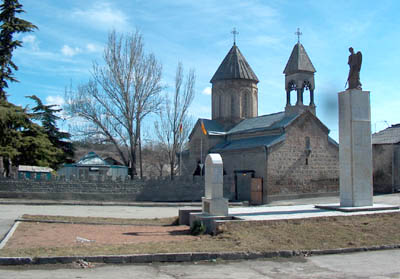Nine Years of Frozen Conflict: Opinions from the Former Georgian Ambassador to Russia
 Russian-Abkhazian border
Russian-Abkhazian border
Nearly a decade ago in August 2008, Russia shocked the international community by sending troops to support South Ossetian separatist attacks on Georgian peacekeepers in the Georgian region of South Ossetia. Russia sent the aid under the auspices of protecting ethnic Ossetians (the majority of whom live across the border in Russia’s North Ossetia) from Georgian aggression. Political analysts, however, theorize that the action was more likely a response to recent talks about Georgia’s NATO membership candidacy.
Although a ceasefire deal was brokered within weeks, Russia subsequently reignited tension by officially recognizing South Ossetia and Abkhazia (another separatist region) as sovereign states independent from Georgia. The United Nations maintains that these territories are part of Georgia, and countries such as the United States were quick to condemn Russia’s political violation of Georgian territorial integrity.
Tensions have cooled down in the nine years since the Russo-Georgian War. In 2012, Giorgi Margvelashvili and the “Georgian Dream” party won a majority in the presidential elections, after a campaign that promised to “normalize” relations with Russia. While understandably attractive given how an ongoing conflict with Russia significantly handicaps any EU or NATO membership application, this campaign promise asks the question as to just how “normal” these relations can be after the severance of formal diplomatic ties between the two countries and with Abkhazian and South Ossetian sovereignty still in dispute.
An interview conducted in June with former Georgian ambassador to Russia Valeri Karlovich Chechelashvili sheds light on the popular theory that Russia purposely destabilizes its neighbours for individual gain. Prior to his service in Russia from 2004 to 2005, Mr. Chechelashvili concurrently served as ambassador to Ukraine and Moldova from 1994 to 1998.

According to former Ambassador Chechelashvili, NATO, the OSCE and the EU all operate on an “accepted reality” of territorial boundaries established in mutual cooperation. To understand what he means by “accepted reality,” one can examine the cases of the city of Sochi, home to the 2014 Winter Olympics, and the peninsula of Crimea. The “accepted reality” today is that Sochi belongs to Russia, even though Sochi was originally within Georgian territory and was incorporated into the Russian Soviet Socialist Republic in the 1920s. Likewise, despite the fact that Crimea belonged to the Russian SSR as recently as 1954, “accepted reality” among Western cooperative alliances is that Crimea belongs to Ukraine.
To that end, according to Mr. Chechelashvili, Russia acts in disregard to the territorial integrity of state boundaries according to Western alliances’ accepted reality, preferring to design its own rules. He denounces Russia’s alleged claims of “supporting democracy” by holding referenda in these regions as empty rhetoric on the basis that Russia itself does not hold fair elections. Therefore, it is obvious to Georgian politicians like Mr. Chechelashvili that Russian aggression is a strategy to advance political influence rather than support democracy, and furthermore that Russia believes itself to be “above” democracy. To support this bold claim, Mr. Chechelashvili cites the Russian concept of “sovereign democracy,” namely, the prerogative of a sovereign state to decide what democracy means and whether it has one. To Mr. Chechelashvili, this is ludicrous because democracy is not a costume that can be tailored to fit an authoritarian regime.
As Russia remains politically hostile, it loses the “natural advantages” it holds in relation to Georgia. Once Georgia’s number one trading partner, Russia has had its rank usurped by Turkey. Furthermore, strict visa requirements imposed by Russia mean that Georgian youth are less likely today than in previous years to pursue higher education in Russia, which means that the Russian language is declining in Georgia as young people pursue English as a second language in hopes of eventual enrollment in European universities. Anecdotally, the orientation of today’s Georgian youth is strongly pro-Europe: Mr. Chechelashvili provided the anecdote that “[Georgian] youth can name only Moscow, Saint Petersburg, and maybe Sochi, but are able to name hundreds of European cities.” According to Anna Koridze, a graduate of Tbilisi State University, “almost every Georgian student wishes to study in Europe.”
To that end, any Georgian government that recognizes the independence of Abkhazia and South Ossetia will be immediately rejected by Georgia’s citizens, says Mr. Chechelashvili, presumably alluding to Ukraine’s Maidan Revolution. Georgia’s Euro-Atlantic orientation is far too entrenched in the political culture for direction to change. Critically, Russia knows this: that’s why Mr. Chechelashvili argues that Russia’s ultimate goal is not to annex Abkhazia or South Ossetia. Rather, Russia hopes to give their separatist movements enough support that an opportunity is available for Russia to intervene in Georgian affairs under the guise of conflict mediation. Although Russia mediated with legitimacy as Western players failed to act during humanitarian crises that broke out immediately after the breakup of the Soviet Union, it’s a role they now abuse.

According to Mr. Chechelashvili, Russia’s policy of supporting separatists is a mistake on Russia’s part and is the reason why Europe is fundamentally more attractive to Georgians. More specifically, trade, investment, and culture are more conducive to soft power expansion than conflict mediation in the situations of instability caused by the same party who hopes to mediate that conflict.
When asked about long-term resolutions to the conflicts over Abkhazia and South Ossetia, Mr. Chechelashvili replied that no resolution will be reached as long as Putin remains in power, as neither Georgia nor Russia will relinquish its claim to either self-proclaimed state. Essentially, Georgia and Russia are locked in a stalemate. For the citizens of Abkhazia and South Ossetia, this means a continued struggle for freedom of movement, threat of deportation, and possibility of being forced to flee conflict. For now, this frozen conflict will remain frozen, and Georgia will have to find a way to pursue Euro-Atlantic integration despite the serious handicaps imposed by Russia.
